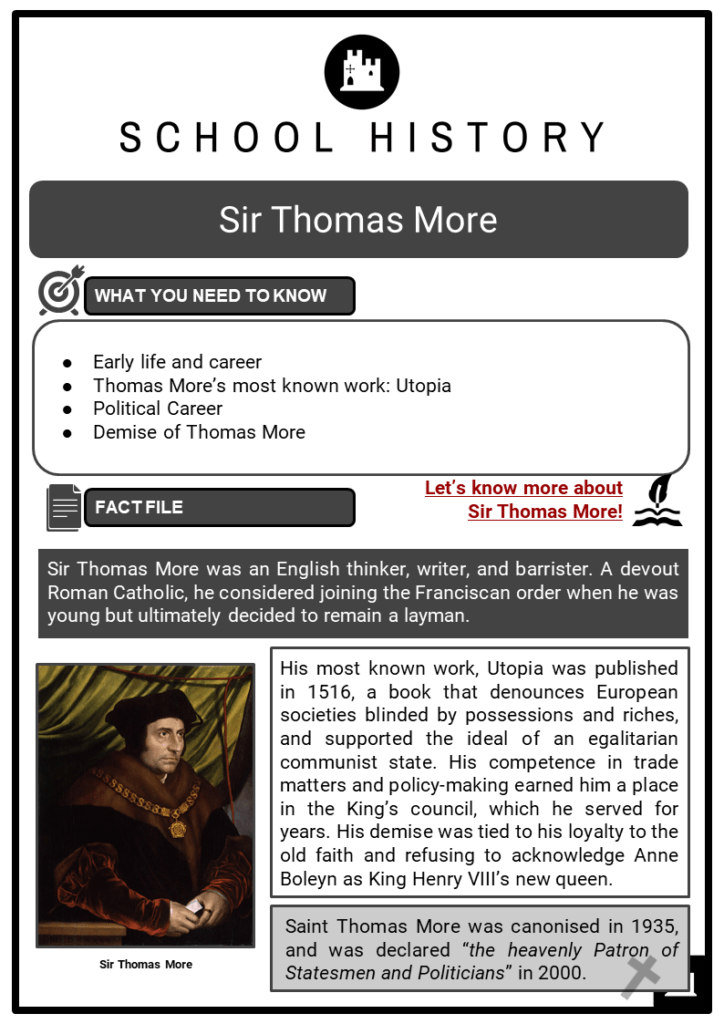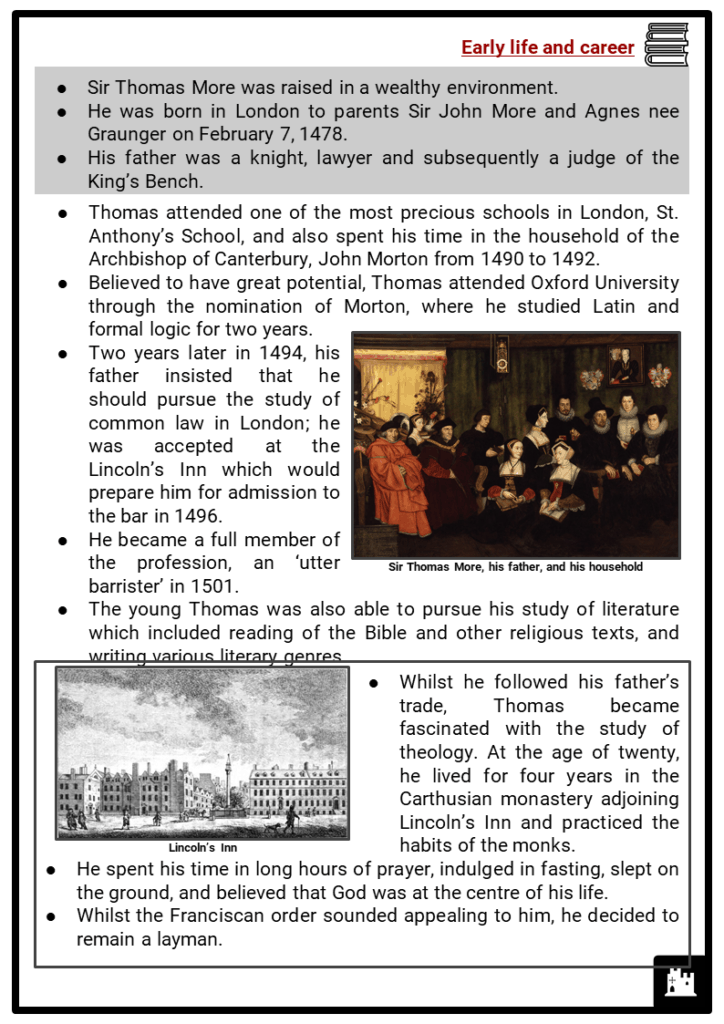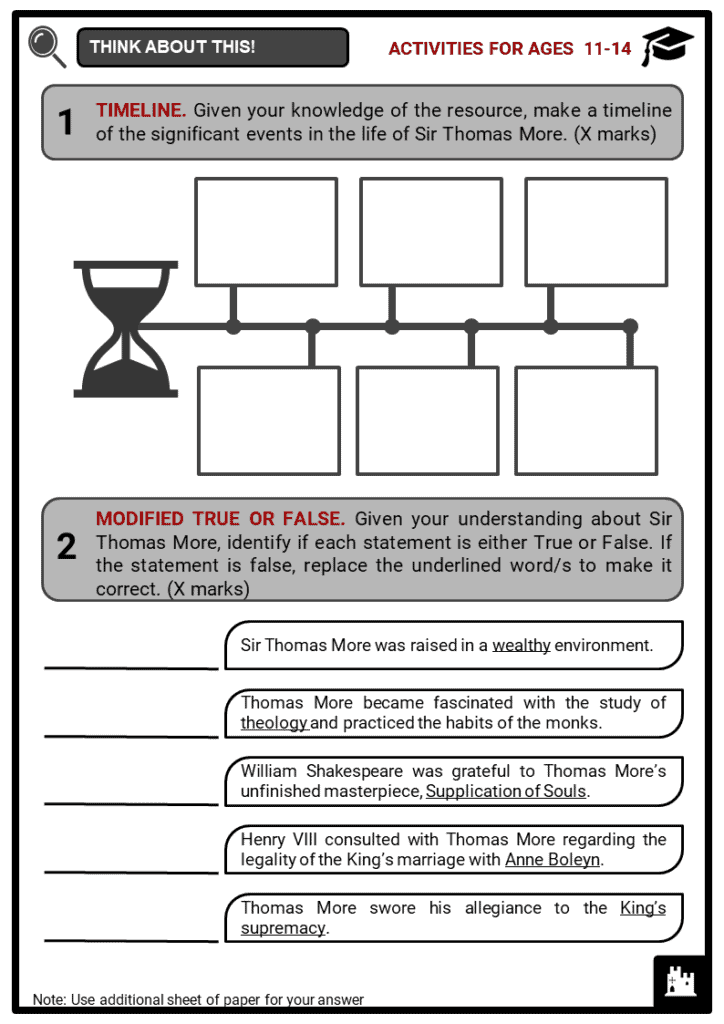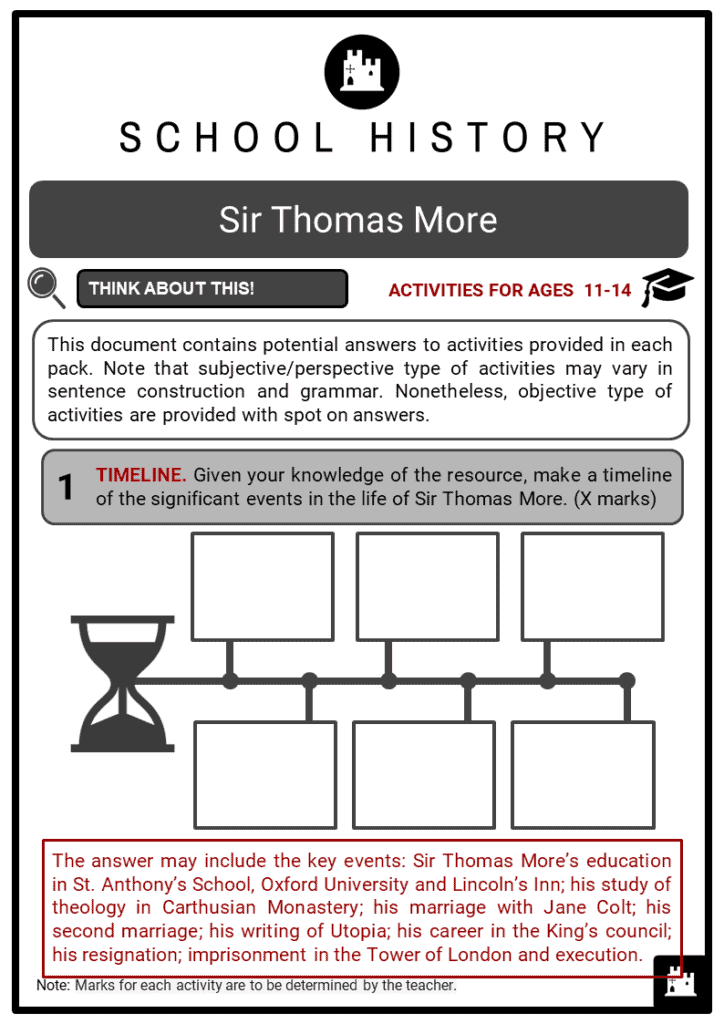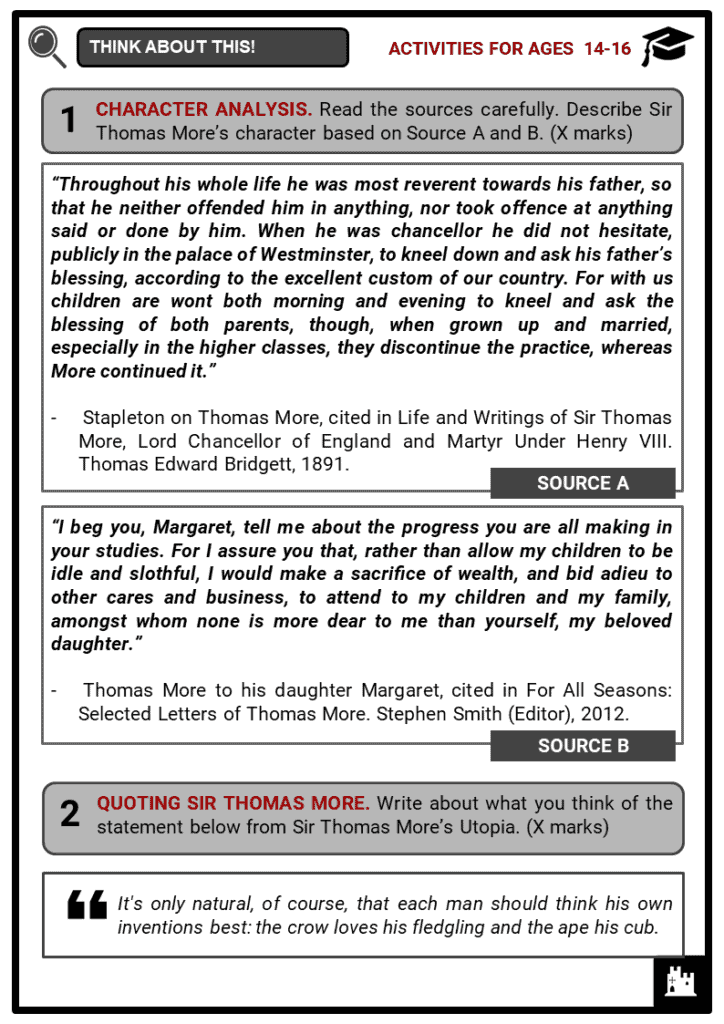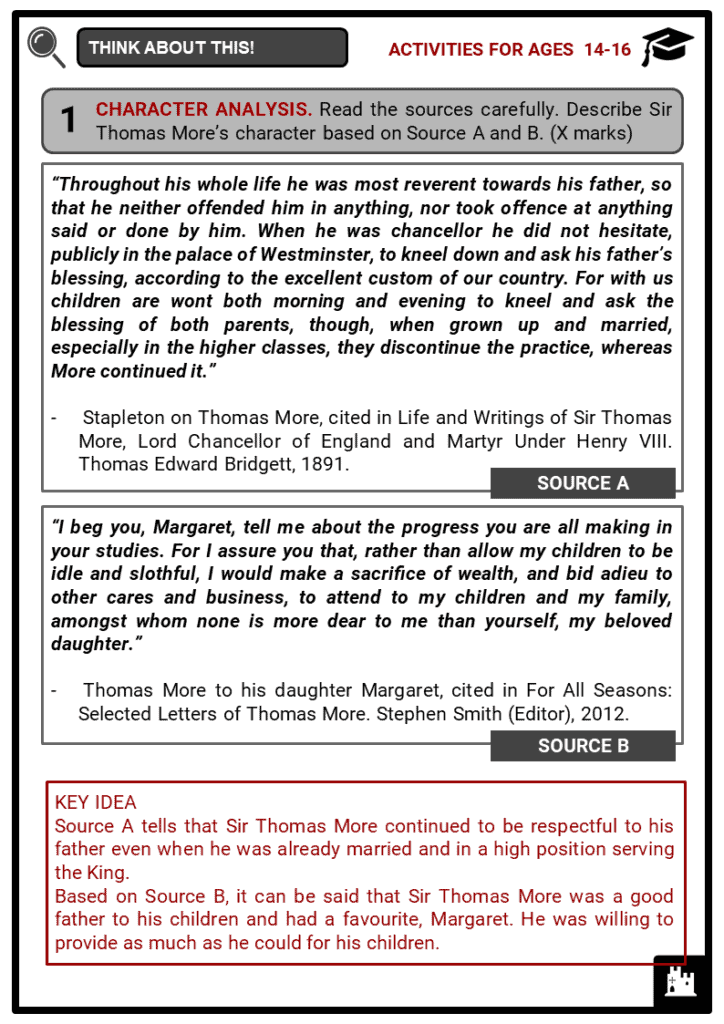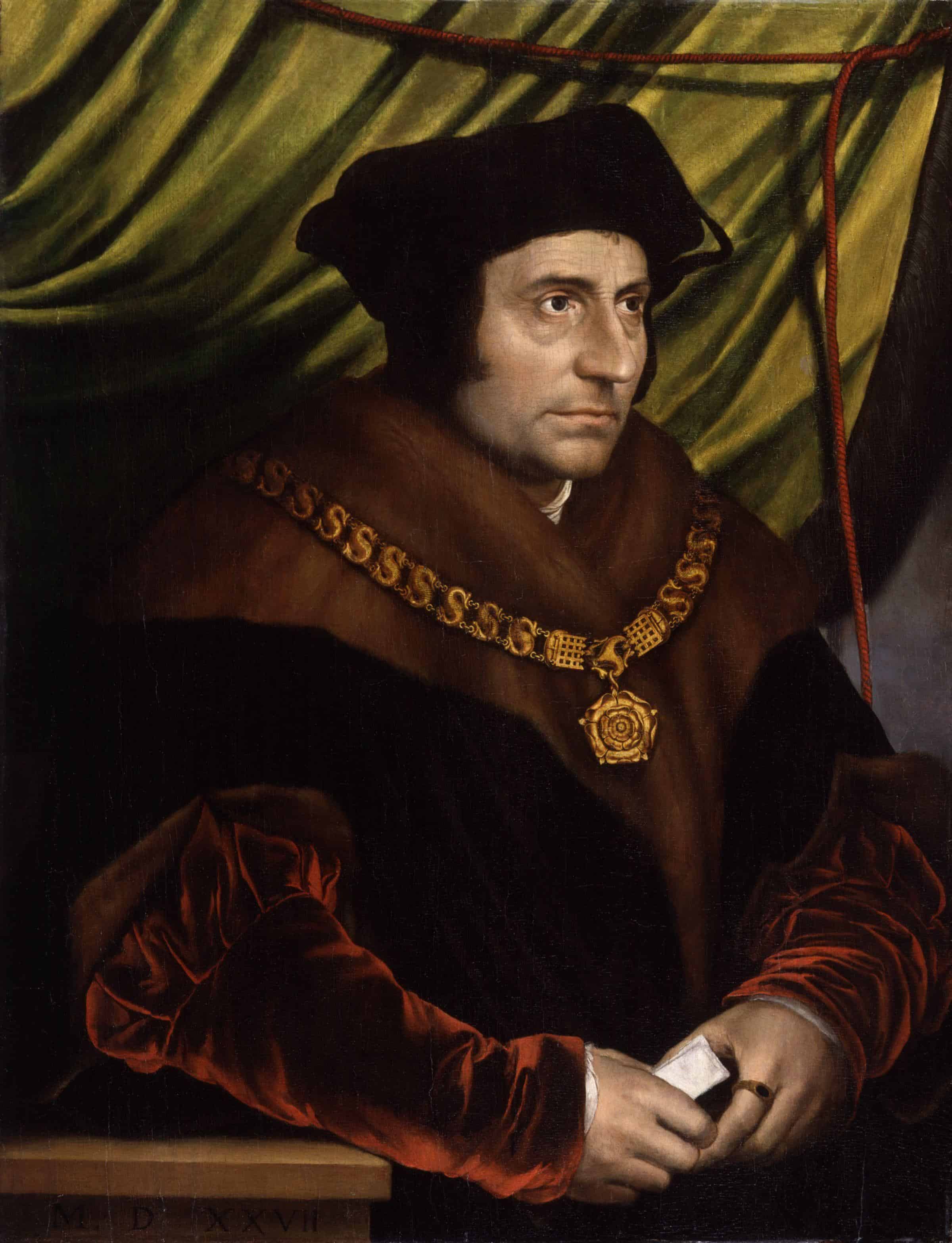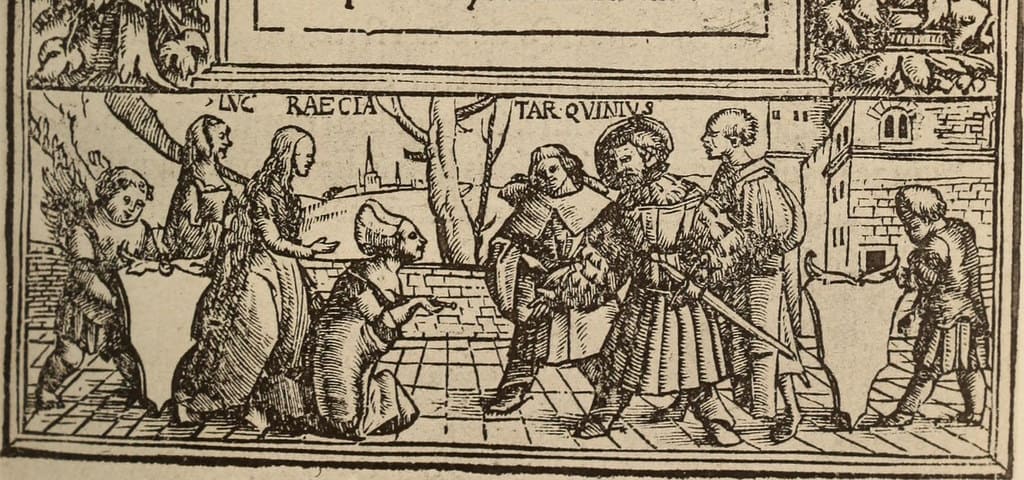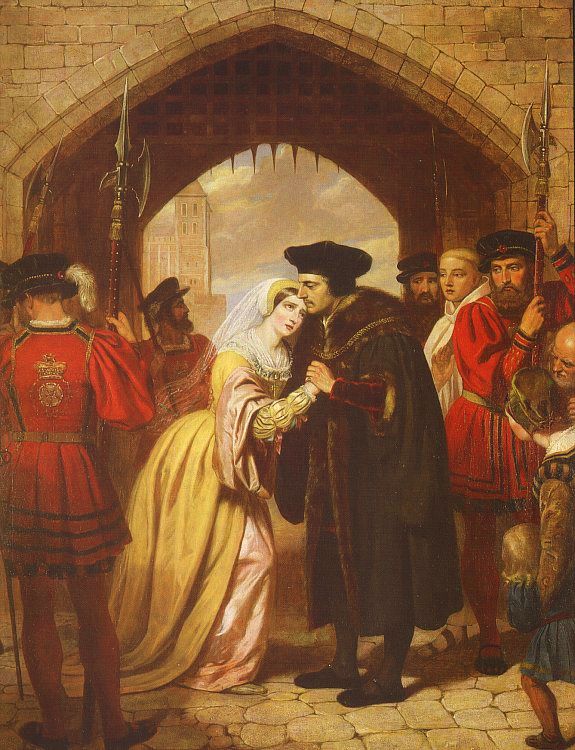Download Sir Thomas More Worksheets
Do you want to save dozens of hours in time? Get your evenings and weekends back? Be able to teach Sir Thomas More to your students?
Our worksheet bundle includes a fact file and printable worksheets and student activities. Perfect for both the classroom and homeschooling!
Table of Contents
Add a header to begin generating the table of contents
Summary
- Early life and career
- Thomas More’s most known work: Utopia
- Political Career
- Demise of Thomas More
Key Facts And Information
Let’s know more about Sir Thomas More!
- Sir Thomas More was an English thinker, writer, and barrister. A devout Roman Catholic, he considered joining the Franciscan order when he was young but ultimately decided to remain a layman.
- His most known work, Utopia was published in 1516, a book that denounces European societies blinded by possessions and riches, and supported the ideal of an egalitarian communist state. His competence in trade matters and policy-making earned him a place in the King’s council, which he served for years. His demise was tied to his loyalty to the old faith and refusing to acknowledge Anne Boleyn as King Henry VIII’s new queen.
- Saint Thomas More was canonised in 1935, and was declared “the heavenly Patron of Statesmen and Politicians” in 2000.
Early life and career
- Sir Thomas More was raised in a wealthy environment.
- He was born in London to parents Sir John More and Agnes nee Graunger on February 7, 1478.
- His father was a knight, lawyer and subsequently a judge of the King’s Bench.
- Thomas attended one of the most precious schools in London, St. Anthony’s School, and also spent his time in the household of the Archbishop of Canterbury, John Morton from 1490 to 1492.
- Believed to have great potential, Thomas attended Oxford University through the nomination of Morton, where he studied Latin and formal logic for two years.
- Two years later in 1494, his father insisted that he should pursue the study of common law in London; he was accepted at the Lincoln’s Inn which would prepare him for admission to the bar in 1496.
- He became a full member of the profession, an ‘utter barrister’ in 1501.
- The young Thomas was also able to pursue his study of literature which included reading of the Bible and other religious texts, and writing various literary genres.
- Whilst he followed his father’s trade, Thomas became fascinated with the study of theology. At the age of twenty, he lived for four years in the Carthusian monastery adjoining Lincoln’s Inn and practiced the habits of the monks.
- He spent his time in long hours of prayer, indulged in fasting, slept on the ground, and believed that God was at the centre of his life.
- Whilst the Franciscan order sounded appealing to him, he decided to remain a layman.
- In 1504, Thomas More married Joan Colt, who came from a family of farmers in Essex.
- They resided in a property called the Old Barge on the Thames side in Bucklersbury in London, and people such as Desiderius Erasmus were given a room in their home.
- In fact, Erasmus wrote Praise of Folly during his stay at the Old Barge.
- Erasmus was a Dutch humanist who was the greatest scholar of the northern Renaissance.
- Thomas travelled across Europe and continued the study of Greek literary texts and also translated several texts into English.
- His competence in trade matters and as an interpreter was proven when he represented various London companies in 1509.
- Between September 1510 and July 1518, Thomas worked for the King and became one of the undersheriffs of London: he was considered an impartial judge, a disinterested consultant, and the general patron of the poor.
- In 1511, his wife died after having given birth to their fourth child.
- However, after only a few weeks he married Alice Middleton - a widow several years older than Thomas.
- He took care of Alice’s daughter from a previous marriage as his own. His children were: Margaret (Roper), Cecily, Elizabeth, Margaret (Clement), and John.
- Thomas More had written notable scholarly and literary works such as poems, frame narratives, religious polemics, and letters.
- Some of these were the History of King Richard III (1513-1518), Utopia (1516), Responsio ad Lutherum (1523), A Dialogue Concerning Heresies (1529), Supplication of Souls (1529), The Confutation of Tyndale's Answer (1532), and A Dialogue of Comfort Against Tribulation (1534).
- William Shakespeare was grateful to Thomas More’s unfinished masterpiece, History of King Richard III.
Thomas More’s most known work: Utopia
- Appointed to a delegation to revise Anglo-Flemish commercial treaty, Thomas visited the Belgian cities while in Bruges in 1515.
- He completed writing and published Utopia in Leuven in 1516, and returned to London thereafter.
- The term ‘utopia’ derives from Ancient Greek ou-topos (literally ‘no place’).
- The book recounts the journey of a pagan in a communist land that is governed by reason.
- Narrated through the conversation between More and a sailor, Raphael Hythlodaeus (his surname signifies ‘pedlar of nonsense’), the book criticises the 16th century English society and describes the existence of a civilisation that lives according to egalitarian principles in a remote island.
- Thomas More’s work is radical because throughout the pages he discriminates private property and denounces the conspiracy of the rich, describing avid men that reject such a communist society as greedy, unscrupulous, and useless.
Key ideas highlighted in Utopia
- Equal opportunities and rights:
- Nobody owns anything but everyone is rich – for what greater wealth can there be than cheerfulness, peace of mind, and freedom from anxiety?
- A society that despises wars and geographical conquests:
- Most princes apply themselves to the arts of war, in which I have neither ability nor interest, instead of to the good arts of peace. They are generally more set on acquiring new kingdoms by hook or by crook than on governing well those that they already have.
- A territory of peace and perfection:
- In Utopia, where every man has a right to everything, they all know that if care is taken to keep the public stores full no private man can want anything; for among them there is no unequal distribution, so that no man is poor, none in necessity, and though no man has anything, yet they are all rich; for what can make a man so rich as to lead a serene and cheerful life, free from anxieties; neither apprehending want himself, nor vexed with the endless complaints of his wife?
- Utopians are individuals that are not concerned with material goods, for they realise that beauty does not lie in the superficial:
- The Utopians wonder how any man should be so much taken with the glaring doubtful lustre of a jewel or a stone, that can look up to a star or to the sun himself; or how any should value himself because his cloth is made of a finer thread: for how fine soever that thread may be, it was once no better than the fleece of a sheep, and that sheep was a sheep still for all its wearing it.
- Through the character of Raphael Hythlodaeus, Thomas denounced the harsh execution methods (death penalty), as well as the punishments that thieves received, the poor conditions peasants had to endure, and the greed and tyranny of the English kings.
- Notwithstanding Thomas’ resolutions for an equal and peaceful society, it is worth noting that the English thinker was not exactly a liberal and open-minded person.
- In fact, he had accused people of being critics in numerous times and had put them to the stake.
- Utopia brought about the rise of a literary genre, Utopian and dystopian fiction, and influenced the works of authors and philosophers.
- In the following centuries, Thomas More’s work inspired other thinkers such as Karl Marx and Friedrich Engels.
Political career
- 1518 - Thomas was invited to join the King’s council of Henry VIII and appointed as Master of Request.
- Upon his appointment, Thomas sought peace and reform.
- Thomas Wolsey, the lord chancellor at the time, was planning the implementation of some of the political ideas of Christian humanists.
- 1521 - Thomas was knighted by the King and was made Treasurer of the Exchequer.
- Thomas participated in talks with the emperor, Charles V and the Hansa merchants at Calais and Bruges.
- Henry VIII knighted and appointed him as treasurer.
- Thomas played an essential role in Henry VIII’s Defence of the Seven Sacraments and advised the King about the principal matters.
- Whilst serving as Treasurer of the Exchequer, he maintained being the King’s confidant and secretary; he answered in the King’s name and fulfilled his duties in foreign relations.
- 1523 - Thomas was made speaker of the House of Commons.
- Upon his election as speaker of the House of Commons, he appealed for a truer freedom of speech in Parliament.
- He was made the high steward of Oxford and Cambridge universities.
- 1525 - Thomas was made Chancellor of the Duchy of Lancaster.
- His promotion as chancellor of the Duchy of Lancaster placed a large portion of northern England under his judiciary and administrative control.
- Upon his return from France in 1527, Henry VIII consulted with him regarding the legality of the King’s marriage with Catherine of Aragon.
- Contrary to the King’s conclusion, he believed that Catherine was the King’s true wife according to his studies.
- In 1528, Bishop Tunstall of London commissioned him to contest heretical writings in the English language for the benefit of more people.
- 1529 - Thomas was appointed as Lord Chancellor.
- England was included in the Treaty of Cambrai through his supervision, resulting in the settlement of mutual debts.
- He succeeded Cardinal Wolsey as Lord Chancellor when the latter fell from power as a result of his failure in foreign policy and in securing the annulment of the King’s marriage to Catherine.
- In 1531, he tried to resign when the clergy declared the King as their supreme head, in contradiction to his belief.
- 1532 - Thomas resigned as Lord Chancellor.
- When the governing body of the church in England swore before the King to never legislate or convene without royal assent (which meant placing the King at the head of the spiritual order), he sought to resign from the King’s office, reporting ill health.
Demise of Thomas More
- Following the success of his divorce from his first wife, Catherine of Aragon, Henry VIII invited Thomas to the coronation of Anne Boleyn.
- However, as a devout Catholic he declined the invitation since he considered the King’s marriage improper and unholy.
- Such a decision cost Thomas More his own life.
- Before the Act of Supremacy was passed in March 1534, Thomas was included in a Bill of Attainder, alleging his involvement with Elizabeth Barton, who prophesied the King’s demise if he would marry Anne Boleyn.
- In fact, Thomas only addressed a letter to Elizabeth, Nun of Kent, warning her against meddling with the state affairs.
- A Bill of Attainder is a legislative act that singles out an individual or group for punishment without a trial.
- In April 1534 when the Act of Supremacy was already in effect, Thomas was summoned to appear before royal commissioners and swear his oath to the act that annulled the King’s first marriage and deemed legal the union with Anne Boleyn.
- The act further denounced papal supremacy and obliged the signing of Oath of Succession, which Thomas had refused to accept.
- Thomas More’s actions were treasonable and as a consequence, he had to be executed on the basis of the Treason Act that was connected to the Act of Supremacy.
- He was imprisoned in the Tower of London for an entire year from 1534 to 1535, and did not have access to pen and paper. Even his books were denied to him.
- He grew a long beard and was filthy and could barely walk due his confinement in the tower.
- During his trial, he was given the option to accept the Act of Supremacy and beg for the King’s forgiveness, to which he declined.
- Whilst he was sentenced to be hanged, drawn, and quartered, the King changed his punishment to execution by decapitation.
- On 6 July 1535, when he was brought up to the scaffold, he uttered his last words to the executioner:
- Pluck up thy spirits, man, and be not afraid to do thine office. My neck is very short. Take heed, therefore, thou not strike awry for saving thine honesty. I die the King’s good servant and God’s first.
- Thomas More’s body was buried at the Tower of London, in the chapel of St. Peter ad Vincula.
- His head was fixed upon a pike and exposed on London Bridge, until his daughter bought it.
- When Henry VIII was informed of Thomas’ execution he abandoned his game of cards and angrily claimed to his new wife Anne Boleyn: ‘Thou art the cause of this man’s death.’
Image sources:
[1.] https://upload.wikimedia.org/wikipedia/commons/5/5c/Sir_Thomas_More_by_Hans_Holbein_the_Younger.jpg
[2.] https://farm3.staticflickr.com/2930/14764084542_3cc7a95610_b.jpg
[3.] https://upload.wikimedia.org/wikipedia/commons/e/e1/Thomas_More%C2%B4s_farewell_to_his_daughter.jpg

